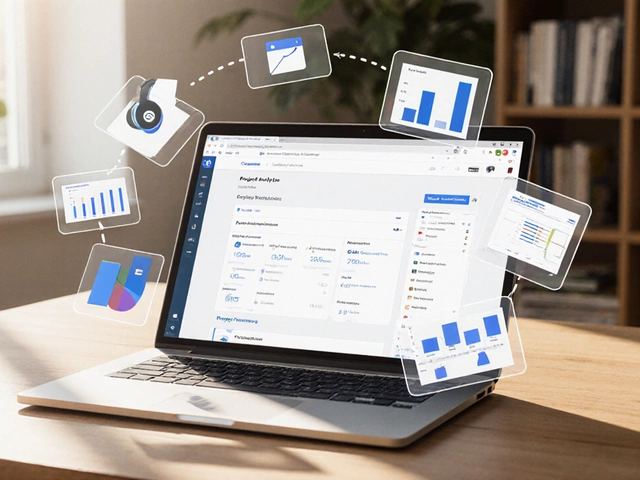
Digital marketing is kinda like the wild west. Tons of opportunities and lots of shiny tools. But if you’re scratching your head wondering which strategy actually brings in the big bucks, you’re not alone. Most folks get lost because the digital marketing landscape keeps shifting. But here’s the scoop - while there are many ways to promote your stuff online, some are worth their weight in gold, while others, not so much.
Let's cut to the chase. You’re looking for a strategy that doesn't just sound cool but actually delivers results, right? Well, understanding what makes a digital marketing approach profitable is your first step. It boils down to ROI - return on investment. You want to get more out than you put in. It's that simple. But, not every strategy suits every business, so it's key to figure out what aligns best with your goals.
- Understanding Profitability in Digital Marketing
- The Reigning Champion: SEO or PPC?
- Email Marketing: The Underrated Gem
- Leveraging Social Media for Maximum ROI
Understanding Profitability in Digital Marketing
When we talk about making your marketing efforts profitable, we're really talking about getting more money out than you put in. The concept itself sounds pretty straightforward, right? Well, the reality is a bit trickier, especially because the digital arena has countless pathways and tactics.
The key to understanding profitability in digital marketing starts with measuring the right metrics. We often hear about ROI, but what's behind that? It's about balancing costs and gains. Upfront expenses like ad spend, content creation, and software tools are the costs. What you gain are conversions, like purchases or sign-ups, and ultimately revenue.
Now, let’s get specific with what works. Did you know that a well-executed SEO strategy can increase organic traffic by over 50% compared to paid campaigns? Meanwhile, email marketing, though often overlooked, boasts an ROI as high as 4400%. Imagine that – generating $44 for every $1 spent!
To maximize profitability, it's vital to focus on channels that align with your business objectives. For instance, if you're a startup looking to grow your email list, investing heavily in email campaigns might be smarter than splurging on expensive online advertising.
Let's not forget the power of testing and tweaking. Your first try might not hit the jackpot, but analyzing results and adjusting your strategy can significantly improve your returns. The landscape of digital marketing is like a living beast - always changeable, but with precise approaches, a rewarding one too.
So, ask yourself: Are your strategies laser-targeted, and do you have a plan for every dollar you’re investing? Because that's what it takes to succeed in digital marketing.

The Reigning Champion: SEO or PPC?
So, you've probably heard about SEO (Search Engine Optimization) and PPC (Pay-Per-Click advertising) if you've dabbled in digital marketing. Picking the top dog between the two is like choosing between pizza and burgers. Both are great, but they serve different cravings.
Let's start with SEO. It's all about earning your spot on the search engine results page without having to whip out your credit card. You optimize your website with relevant keywords (hint: just like "profitable marketing strategy") so people find your site when they're searching on Google. SEO’s biggest advantage? It's a long-term game plan. Once you rank high, you stay there with consistent effort. Bonus: it builds trust with potential customers.
On the flip side, PPC like Google Ads lets you skip the queue and appear right at the top if you’re willing to spend. It’s perfect for when you need results ASAP or when you're launching a new product. The downside is your ad disappears the minute your budget runs out. Quick wins, for sure, but not as sustainable as SEO.
So, which one is more profitable? It depends. For long-term success and building brand authority, SEO is your friend. But if you're eyeing short-term sales boosts, especially during peak seasons, PPC is a solid bet. Many smart businesses actually blend the two, using PPC for immediate impact while steadily working on their SEO for sustained growth.
In the end, it doesn't have to be a choice. Consider each stage of your marketing campaign and decide where each one fits. Just remember, it's not about spending more. It's about spending smart.

Email Marketing: The Underrated Gem
Ever heard that email is dead? Yeah, that's a myth. Email marketing is still a massive player in the game, offering one of the highest ROI across all digital marketing channels. Imagine this: for every dollar spent on email marketing, the average return is about $42. Not too shabby, huh?
One reason why email is such a powerhouse is the deep connection it allows brands to build with their audience. By sending personalized, relevant, and timely emails, businesses can foster a strong relationship with their customers. It's like chatting with a friend, but over email. Plus, it’s a direct line to someone who's already interested in your stuff.
Wanna make your email campaigns even more effective? Segment your audience! Dividing your email list into smaller groups based on demographics, purchase history, or engagement levels can seriously boost open and click-through rates. Imagine knowing exactly what each group wants—saves you from the hassle of sending out one-size-fits-all content.
Let’s talk about automation. Setting up drip campaigns and automated sequences helps keep your brand top-of-mind without being spammy. Think of it like a digital butler that delivers the right message at just the right time.
- Welcome Series: Perfect for onboarding new subscribers.
- Abandoned Cart Emails: Get back those almost-there customers.
- Nurture Sequences: Keep your audience engaged over time.
And, don’t forget to A/B test your emails. Just like in life, sometimes small changes make a big difference. Testing different subject lines, images, or sending times can help you figure out what resonates with your audience.
So, if you're considering which digital marketing strategy to dive into, don't overlook email marketing. It's not just a bunch of digital noise. With the right tweaks, it can become your brand's secret weapon.




